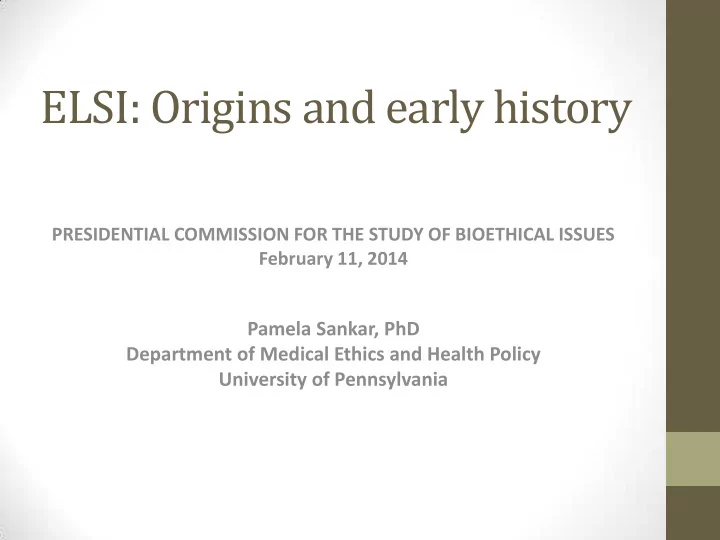

ELSI: Origins and early history PRESIDENTIAL COMMISSION FOR THE STUDY OF BIOETHICAL ISSUES February 11, 2014 Pamela Sankar, PhD Department of Medical Ethics and Health Policy University of Pennsylvania
Proposal to map the human genome: social and ethical concerns • Proposals to map the human genome emerge in the mid- 1980s • Social and ethical issues highlighted in OTA and NAS reports evaluating the advisability of proceeding • Do not make any suggestions about how to address • Press conference. October 1988. • James Watson declares that social and ethical issues will be addressed through a program housed in NIH and funded by a 3 to 5 % set aside from the Human Genome Project budget
ELSI: A Research Mandate • ELSI created as an NIH research program based on investigator-initiated research awards • Philosophers are chosen as first two directors • First mission statement lists nine research areas including: • individual psychological responses to knowledge of genetic variation • uses and misuses of genetics in the past • conceptual and philosophical implications of the Human Genome
ELSI: A Policy Mandate • Congress expresses ongoing concern over how HGP would handle potential social and ethical issues • Watson declares: ELSI will create policies • No guidelines • Unrecognized gap between expertise required for basic philosophical, ethical, legal and sociological research and policy making
Ethics as misunderstanding, mistakes, & misconduct • Watson: we must “ ensure that society learns to use the information only in beneficial ways ” • Problems are external to the science: • public misunderstands claims about the relationship between disease and genetics; health insurers misconstrue the significance of carrier status; scientists exaggerate significance of findings • Solutions are technical, practical, and targeted
Ethics as the relationship between science and the common good • Normative inquiry • Not only RCR questions: Is it true? Is it fair? But also: is it wise? • What ought to be done? • Sociological inquiry: • How are topics are chosen and research designed? • For whom and in what ways will the results be useful? • Cui bono? Does the research perpetuate or ameliorate health disparities?
Bridging the gaps: Creating new communities • NIH-DOE Working Group on Ethical, Legal, and Social Implications of Human Genome • ELSI research consortia
Recommend
More recommend